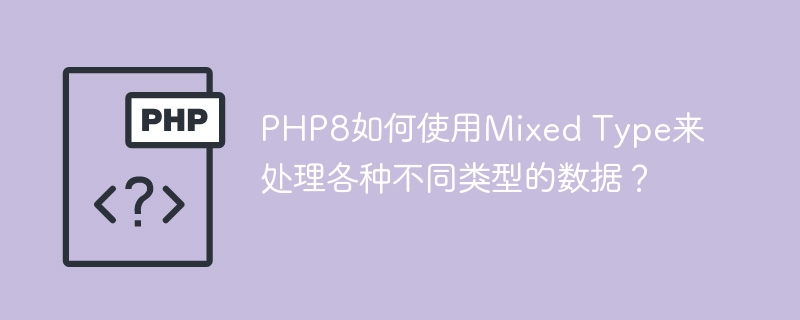

How does PHP8 use Mixed Type to handle various types of data?
Abstract:
PHP8 introduces Mixed Type, which is a flexible data type that can handle various different types of data. This article will introduce the characteristics of Mixed Type and provide some specific code examples to help readers better understand the use of Mixed Type in PHP8.
Introduction:
In past PHP versions, we often used different types of data, such as strings, integers, floating point numbers, arrays, etc. However, some difficulties may be encountered when dealing with these different types of data, requiring type checking and conversion. To solve this problem, PHP8 introduced Mixed Type, which is a universal type that integrates different types of data. Next, we will discuss the characteristics of Mixed Type in detail and provide some specific code examples using Mixed Type.
1.1 Flexibility: Mixed Type can handle different types of data, including strings and integers , floating point numbers, arrays, etc. This means we can store different types of data in the same variable without the need for type conversion.
1.2 Weak type support: Mixed Type is part of the PHP weakly typed language. This means we can perform different types of operations in Mixed Type variables without errors or exceptions.
1.3 Dynamic type checking: PHP8 introduces Mixed Type, which can provide better type checking support through static analysis tools or IDEs. This can help us understand the code better and reduce potential type errors.
/**
* @param mixed $data
* @return mixed
*/
function processMixedType($data) {
if (is_array($data)) {
return array_map('processMixedType', $data);
} elseif (is_string($data)) {
return strtoupper($data);
} elseif (is_numeric($data)) {
return $data * 2;
} else {
return $data;
}
}
$var = [
'string',
123,
4.56,
['nested', 'array'],
];
$result = processMixedType($var);
print_r($result);In the above example, we created a function named processMixedType, which accepts a parameter of Mixed Type $data. Depending on the type of data, the function takes different actions. If $data is an array, we will recursively call the processMixedType function to process each element of the array; if $data is a string, we will Convert to uppercase; if $data is a number, we multiply it by 2; otherwise, we return the original $data.
Then, we define a Mixed Type variable $var, which contains different types of data. We called the processMixedType function, passing in $var as the parameter, and stored the return value in $result. Finally, we use the print_r function to print out the value of $result.
Summary:
Mixed Type is a new data type introduced in PHP8, which can handle various types of data. Mixed Type has features such as flexibility, weak type support, and dynamic type checking. We can use Mixed Type to handle variables containing multiple types of data and perform appropriate operations on different types of data. This article provides some specific code examples to help readers better understand the use of Mixed Type in PHP8.
The above is the detailed content of How does PHP8 use Mixed Type to handle various types of data?. For more information, please follow other related articles on the PHP Chinese website!




